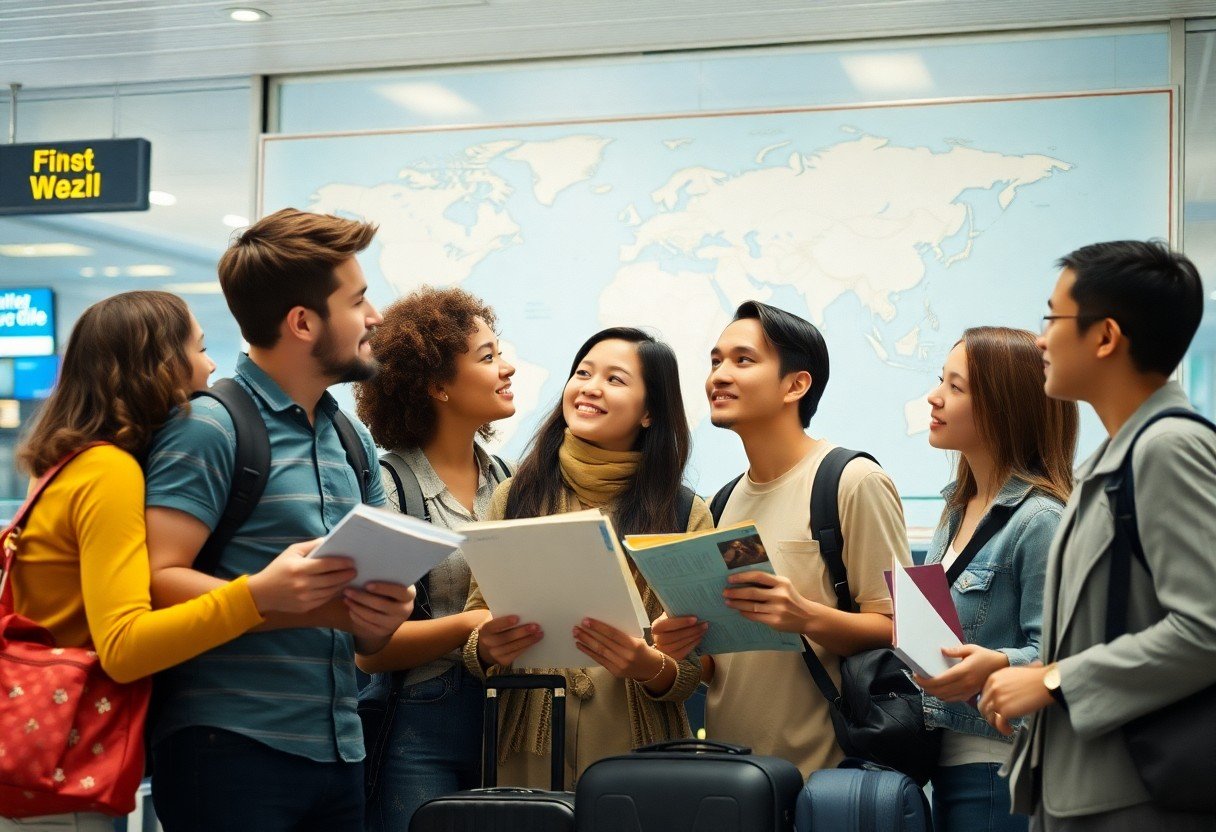Over the course of your international adventure, determining the right preparations can significantly enhance your experience. As you set off, it’s necessary to familiarize yourself with local customs, ensure your documents are in order, and understand safety measures in your destination country. Be sure to check key travel alerts and instructions Before You Go for important insights. With the right knowledge and planning, you’ll be well-equipped to navigate the excitement and challenges of traveling abroad.

Preparing for Your Trip
To ensure a smooth travel experience, it’s necessary to start preparing well in advance. Please consider creating a checklist that includes booking flights, securing accommodation, and researching your destination. This preparation phase will help you stay organized and ease any last-minute stress as your departure date approaches.
Passport and Visa Requirements
Among the first steps in your travel preparation is checking your passport and visa status. Ensure that your passport is valid for at least six months beyond your planned travel dates. Depending on your destination, you may also need to apply for a visa before you travel, so be sure to review the specific entry requirements for your country.
Health and Vaccinations
The health and safety of your trip should be a top priority. It’s wise to consult with your doctor well ahead of your departure to discuss any necessary vaccinations or medications that may be required in your destination.
Further, staying informed about local health risks is vital. Some countries require specific vaccines, such as for yellow fever or hepatitis A, while others may recommend taking anti-malarial medication if you’re traveling to tropical areas. Additionally, ensure your routine vaccinations are up to date and consider obtaining health insurance that covers international travel. Being proactive about your health ensures you can enjoy your trip without any unexpected setbacks.

Packing Essentials
Some imperative items need to make it into your suitcase before you commence on your international journey. Consider the climate of your destination and pack versatile clothing that can be layered. Don’t forget about travel-sized toiletries and a compact first aid kit, which will save you headaches while on the go. A reliable suitcase, comfortable shoes, and an easy-to-carry daypack should round out your packing list.
Clothing and Accessories
Packing smartly for your trip means choosing the right clothing and accessories. Opt for lightweight, wrinkle-resistant fabrics that can be mixed and matched, and include a couple of neutral layers for different occasions. Appropriate footwear is important too; ensure you have comfortable walking shoes. Accessories like a travel scarf or hat can provide added versatility and style, while also protecting you from the elements.
Travel Documents and Money
About your travel documents and money, it’s imperative to keep everything organized and secure. Make copies of your passport, visa, and important identification, and store them separately from the originals. Consider obtaining local currency before you leave to avoid high exchange rates or withdrawal fees in foreign ATMs. Don’t forget a travel wallet to keep your cash, credit cards, and documents safe and easily accessible.
Understanding how to handle your travel documents and money is key to a smooth experience abroad. Ensure you have at least two forms of payment, preferably a mix of cash and credit/debit cards, for flexibility. Make sure your cards have no foreign transaction fees and notify your bank of your travel plans to prevent your accounts from being flagged. Utilizing a money belt or secure pouch helps protect your valuables while navigating unfamiliar places, giving you peace of mind during your travels.
Understanding Local Customs
Even the most well-planned trip can be derailed by a misstep regarding local customs. To ensure a smooth experience, take some time to research the traditions, social norms, and practices specific to your destination. This knowledge will not only enhance your travel experience but also show respect for the culture you are visiting, allowing you to engage more genuinely with the locals and avoid any potential faux pas that could make your journey uncomfortable.
Cultural Etiquette
Against the backdrop of global travel, misreading cultural etiquette can lead to misunderstandings. Each country has its own set of unwritten rules regarding greetings, dining, and public behavior. For instance, in some cultures, direct eye contact is seen as disrespectful, while in others, it’s a sign of honesty. Familiarizing yourself with these nuances will help you navigate social situations with ease and foster positive interactions with locals.
Language Basics
Against the backdrop of a foreign language, even a small effort can make a big impact. Learning basic phrases like “hello,” “thank you,” and “please” can significantly enhance your interactions. While you don’t need to be fluent, demonstrating a willingness to communicate can create warmth and openness, making locals more inclined to assist you. Consider downloading translation apps or carrying a phrasebook to facilitate your conversations.
With a few simple phrases in your linguistic toolkit, you can turn challenging moments into rewarding connections. Not only will learning the language basics foster goodwill, but it may also lead to unexpected opportunities. For instance, engaging in conversation can yield insider tips or unique experiences that guidebooks often overlook. You might stumble upon a local festival or be invited to a meal, enriching your travel adventure in ways you least expect. All it takes is a little effort to show that you’re trying to bridge the language barrier and connect on a personal level.
Navigating Transportation
Many first-time international travelers may find navigating transportation to be daunting. However, with a little research and planning, you can easily move around your destination with confidence. From public transport to private rentals, it’s important to understand the options available to you and choose the best mode that fits your needs and budget.
Public Transport Options
With many cities offering efficient public transport systems, you can often get around without the need for a car. Buses, subways, and trams are not only economical but also allow you to experience the local culture. Be sure to download transport apps relevant to your destination to check schedules and routes.
Car Rentals and Driving Abroad
For those who prefer the freedom of driving, renting a car can be a great choice. However, understanding the local driving laws is vital; you might need an international driving permit and should familiarize yourself with the road signs and local driving customs.
Another consideration when renting a car is to choose a reputable company and review their policies regarding fuel, insurance, and mileage. Be cautious of driving in unfamiliar regions, as navigating narrow streets or different road rules can be challenging. Additionally, be aware that some cities have congestion charges or restricted zones, which can lead to unexpected expenses. Always keep your personal safety in mind and have a reliable GPS or offline maps available to avoid getting lost.
Safety and Security Tips
Despite the excitement that comes with international travel, prioritizing your safety is necessary. Stay alert and follow these tips to enhance your travel experience:
- Keep your valuables secured and out of sight.
- Research local laws and customs before arriving.
- Invest in a reliable travel insurance policy.
- Share your itinerary with someone you trust.
This will help you stay vigilant throughout your journey. For more detailed information, check out these Tips For Traveling Abroad for the First Time.
Keeping Your Belongings Safe
Above all, ensure your belongings remain secure throughout your trip. Use anti-theft bags, and always keep your passport and important documents in a safe place. When using public transportation, be mindful of your surroundings and avoid opening your bags in crowded areas.
Emergency Contacts and Procedures
Before you commence on your journey, take the time to research and note down emergency contacts, including local authorities and your country’s embassy. Having quick access to this information can help you navigate unexpected situations smoothly.
Also, familiarize yourself with local emergency numbers, as they can differ from what you’re used to at home. It’s beneficial to have an emergency plan in place, such as knowing where the nearest hospital is, what to do in case of a medical emergency, and who to contact. While situations can be overwhelming, being informed enhances your safety and gives you peace of mind during your travel experience.
Making the Most of Your Experience
Unlike typical vacations where you may stick to a fixed agenda, international travel opens the door to spontaneous discoveries and unique adventures. Embrace each moment by allowing yourself to explore beyond the standard tourist spots and immerse yourself in the local culture. Be open to trying new activities, cuisines, and experiences that can create lasting memories, helping you to gain a deeper appreciation for the places you visit.
Creating a Flexible Itinerary
With a flexible itinerary, you can seize unexpected opportunities and adjust your plans based on new insights or locals’ recommendations. While it’s important to have a general outline of your travels, leaving room for spontaneity can lead to unforgettable experiences that strict schedules might miss.
Engaging with Locals
One of the most enriching aspects of traveling is connecting with locals, who can provide you with invaluable insights into their culture and way of life.
It’s necessary to approach local interactions with an open mind and a genuine interest in understanding their perspectives. You can initiate conversations by asking for recommendations on restaurants or attractions, or simply by chatting about daily life. This can lead to unique experiences, such as discovering hidden gems or participating in local traditions. Just be mindful of cultural differences; some people may be wary of engaging with strangers. Approach them politely and respect their boundaries, and you may find that most locals are welcoming and eager to share their stories. Engaging with locals not only enhances your trip but also fosters connections that transcend borders.
Conclusion
As a reminder, navigating your first international trip can be smooth with the right preparation. Always research your destination’s culture, adhere to travel advisories, and ensure your documents are in order. Prioritize packing light, staying connected, and keeping crucial items accessible. Lastly, embrace flexibility and an open mind as you explore new environments. Your adventure awaits—make the most of it!









